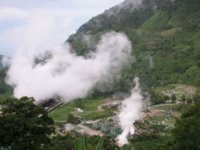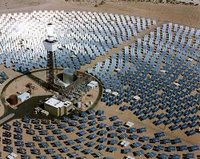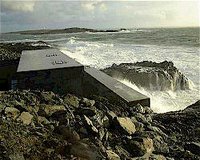Winston Churchill once said that Americans will always do the right thing... as a last resort! Though that may be a bit pessimistic, sadly, there is probably some logic to that statement. An environmental metaphor that one might draw from Mr. Churchill's quip is one of resources and consumption, or, supply and demand, if you like economics. The massive urban developments in the middle and far east have out-scaled anything westernized nations have attempted, and they are making some advancements in methods to sustainably create and maintain these new urban areas. However, the lifestyles of the westernized societies that these countries emulate, even if just partially, are not responding fast enough to the unfortunate reality of the world's dwindling resource availability. The scale of development worldwide, coupled with a continuous dependency on fossil fuels, poses an interesting problem that there is no clear, single answer to. How does the world allow economic development and cultural potential while at the same time restricting the over consumption of remaining resources? A possible partial solution (in addition to first world countries drastically reducing consumption) may be a renewable energy superstructure for rapidly urbanized areas. It would comprise of a matrix of renewable energy facilities geographically placed for maximum production and minimum impact. Any of the individual modes of production could in no way support the entire area, but, as a part of a larger superstructure, the pieces form a comprehensive "Energy Web" that does not completely rely on any single form of production.
 Geothermal energy is provocative and seemingly endless, even without imagining drilling into the center of the earth. Its applications, though difficult to harness in some cases, are consistently proving to offer reliable means to collect or generate energy. From constant ground temperature to volcanic steam vents the fact that the majority of the earths mass is a molten core of rock and metal is hard to ignore.
Geothermal energy is provocative and seemingly endless, even without imagining drilling into the center of the earth. Its applications, though difficult to harness in some cases, are consistently proving to offer reliable means to collect or generate energy. From constant ground temperature to volcanic steam vents the fact that the majority of the earths mass is a molten core of rock and metal is hard to ignore. With increased technology and awareness, wind generated electricity is rapidly becoming a much more viable means to power our lives. The use of a meteorological phenomena to generate motion or electricity is not a new idea, but with current advancements in design and policy based initiatives wind power will play a huge factor in the global energy market.
With increased technology and awareness, wind generated electricity is rapidly becoming a much more viable means to power our lives. The use of a meteorological phenomena to generate motion or electricity is not a new idea, but with current advancements in design and policy based initiatives wind power will play a huge factor in the global energy market. The sun is responsible for the existence of all life on Earth. All of the planet's growing systems assimilate everything from a small star at the heart of our solar system. Unfortunately solar technology has been slow to develop into a widespread energy harvesting method for reasons that range from the expense of solar panels to the suppression of solar advocacy and technology by conventional energy lobbyist.
The sun is responsible for the existence of all life on Earth. All of the planet's growing systems assimilate everything from a small star at the heart of our solar system. Unfortunately solar technology has been slow to develop into a widespread energy harvesting method for reasons that range from the expense of solar panels to the suppression of solar advocacy and technology by conventional energy lobbyist. Hydroelectric energy production has, like wind power, been around for a long time. However, the large scale installation of dams worldwide have proven to be one of the most disruptive and damaging of human efforts to terrestrial ecosystems. But like free flowing rivers, the undulations of the worlds oceans have untapped and practically endless applications for free energy production. This could be applied on a large scale in most coastal areas and even within sensitive habitat.
Hydroelectric energy production has, like wind power, been around for a long time. However, the large scale installation of dams worldwide have proven to be one of the most disruptive and damaging of human efforts to terrestrial ecosystems. But like free flowing rivers, the undulations of the worlds oceans have untapped and practically endless applications for free energy production. This could be applied on a large scale in most coastal areas and even within sensitive habitat.Through the quest for self importance and universal convenience, the resources that were once so plentiful just a century or two ago are now scarce commodities. It seems now, just as the early Buddhist used the four great elements to explain and understand their earthly suffering, modern humans have reinterpreted their perspectives of earth, air, fire and water in efforts to gain ground in the global scramble for survival.
Post submitted by W. A. Aultman / WilliamAultman@EcoUrbanity

No comments:
Post a Comment